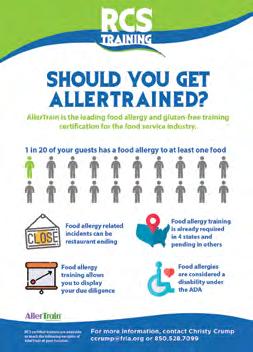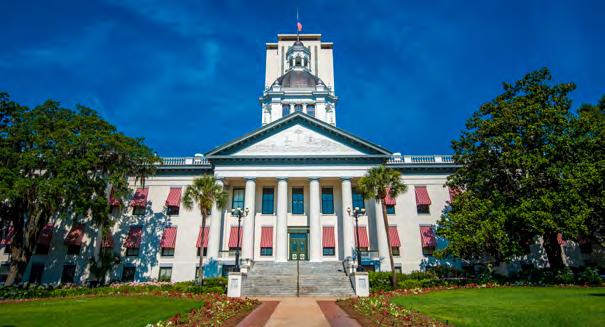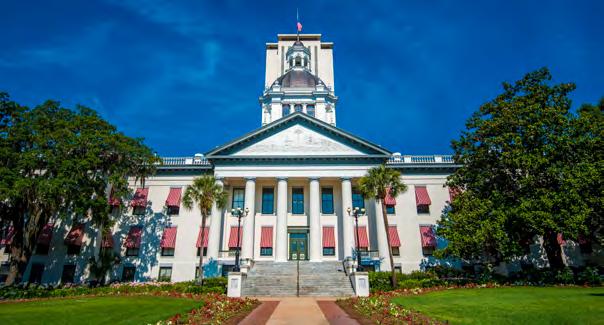
9 minute read
Minimum Wage FRLA and Business Coalition Work Together to Defeat Amendment 2
FRLA and Business Coalition Work Together to Defeat Amendment 2
FRLA and several business associations are working together to create an awareness campaign describing the negative impact of Amendment 2. Amendment 2 is a proposed amendment to Florida’s constitution that will raise the minimum wage in Florida to $15 per hour by 2026. Floridians will be asked to vote on Amendment 2 in the upcoming November 3, 2020 election.
Save Florida Jobs, the coalition’s political committee’s operating name, met recently to create awareness and to discuss the impact, both intended and unintended, if this referendum is passed.
Amendment 2 will result in a 75% increase in labor costs over five years. In order to accommodate this increase, employers may be forced to: » r educe staff » r educe hours for employees » r educe employee benefits » incr ease the use of automation » eliminate entr y level positions » incr ease prices. In addition to increased labor costs, if passed, this proposal will impact the tip credit. Florida’s tip credit is frozen at $3.02. If Amendment 2 passes, the required wage will go up, but the tip credit will stay the same. This means employers of tipped employees will have to pay a significantly higher required cash wage for tipped employees.
For example Currently 8 employees, 12,000 total tipped employee hours x $5.54 = $66,480 per year.
Total increase is $77,280. Paid political advertisement paid for by Save Florida Jobs, Inc., 230 South Adams St., Ste. 200, Tallahassee, FL 32301. After passage of Amendment 2 8 employees, 12,000 total tipped employee hours x $11.98 = $143,760 per year.
Employers of tipped employees can estimate how much the passage of Amendment 2 will cost by using FRLA’s calculator found on https://frla.org/minimum-wage.
To address this issue, the Coalition is raising funds to generate voter awareness. To donate visit frla.org/minimum-wage.
AD Exclusive Non Auditable Programs for Hotels and Restaurants.

Risk Strategies is the country’s leading specialty real estate insurance brokerage and risk management advisor.
Robert Grady | Vice President 239-405-6802 | rgrady@risk-strategies.com
www.RiskStrategies.com Part of Insurance Council for the FRLA
AD

Lowering your natural gas bill is a piece of cake

At Infinite Energy, we want to make it easy for you to manage your energy account. Call today, and find out how you can get a custom natural gas plan that combines low rates with great service.
“We partnered with Infinite Energy in July 2015 for our gas utility needs at our Florida Applebee’s. Their experience, commitment to service and industry knowledge was instrumental in guiding us through the process of hedging our rates, resulting in valuable cost savings . We highly recommend teaming up with Infinite Energy!” - Mike Veneziano
PREFERRED PARTNER
DOING MORE FOR YOU
You Have Enough to Worry About! Payroll, Employee Benefits & Liability Management should NOT be added to that list.

Let Key HR relieve you from the daily human resource tasks, so you are free to do what you do best!

800.922.4133
keyhro.com

Zenith Is Your Restaurant and Hotel Specialist

WORKERS’ COMPENSATION SPECIALISTS
Zenith specializes in helping a broad spectrum of restaurants and hotels with their workers’ compensation needs via the following:
Safety & Health Services • Zenith’s expertise on workplace safety allows you to remain focused on your business. • We partner with you to create a culture of safety at work that sends the right message to your employees to decrease the risk of injuries and illnesses.
Claims Management • Our in-house nurses, doctors, claims experts, attorneys, and investigators collaborate to achieve the best outcomes for your business.
Fighting Fraud • We’re an industry leader in investigating and exposing potential fraudulent workers’ compensation activity.
Policyholder Resources • We offer a vast array of online resources, support, and tools that are available 24/7. Access your policy, submit and view your claims, use Zenith Solution Center ® , make a payment, report payroll, and more!
Zenith is the endorsed workers’ compensation carrier of the FRLA.
Learn More at TheZenith.com ®


2020 LEGISLATIVE REPORT
VACATION RENTALS
DIED IN COMMITTEE SB 1128 by Senator Diaz (R-Hialeah) HB 1011 by Representative Fischer (R-Jacksonville) In 2011, Florida preempted vacation rental regulation to the state, preventing local governments from enacting any new law that restricted the use of vacation rentals, prohibited vacation rental, or regulated vacation rentals based on their classification, use or occupancy. In 2014, the Legislature revised the preemption of 2011 so that local governments could regulate vacation rentals, provided the regulations do not regulate the duration or frequency of vacation rentals. Since that time, there has continued to be a great deal of turmoil regarding the regulation of vacation rentals and vacation rental hosting platforms. FRLA did not support the bills as filed because the legislation did not strike the right balance in regard to vacation rental and hosting platform regulations. FRLA supported significant amendments to the bill, which included provisions such as: requiring a hosting platform to affirmatively verify the license and registration of all units advertised on its platform; requiring the hosting platform to collect and remit taxes for the units rented through its platform; and requiring hosting platforms to remove illegal rental listings. While the bills as amended did not include all the provisions for which we advocated, we felt it was a huge step in the right direction. We supported the amended version of the bills. Due to continued concerns regarding local control of vacation rentals, the bills stalled in both the House and Senate and ultimately died. We will continue to advocate for this issue in future sessions to ensure that all Florida visitors enjoy a safe, lawful and high-quality lodging experience, no matter where they choose to stay. VISIT FLORIDA
PASSED SB 362 by Senator Hooper (R-Clearwater) HB 213 by Representative Ponder (R-Fort Walton Beach) VISIT FLORIDA plays a key role in feeding and growing Florida’s strong tourism industry. After receiving a one-year re-authorization in the 2019 legislative session, additional legislation would be necessary to allow VISIT FLORIDA to continue. This means that if no legislative action was taken, VISIT FLORIDA would no longer exist. SB 362 and HB 213 were filed to re-authorize VISIT FLORIDA for eight years. The Senate demonstrated significant support for VISIT FLORIDA, passing SB 362 unanimously. Having never heard HB 213 in committee, the House passed an amendment to SB 362 to re-authorize VISIT FLORIDA for three years. The Senate concurred with the House amendment. Under SB 362, re-authorization for VISIT FLORIDA will expire in October 2023. Following budget conference and negotiations between the House and Senate, the chambers agreed to fund VISIT FLORIDA in the amount of $50 million.
QUESTIONS? Contact FRLA Government Relations Team at 850-224-2250: Richard Turner, Senior VP of Legal and Legislative Affairs at ext. 248. Samantha Padgett, General Counsel at ext. 228. Mary Rose Mccarron, Legislative Analyst and Event Coordinator at ext. 225
TOURIST DEVELOPMENT TAX EXPANSION
DID NOT PASS HB 7097 by Representative Avila (R-Miami Springs) House Bill 7097 was the House’s “Tax Package”, meaning that it is comprised entirely of issues relating to taxation. House Bill 7097 was filled with tax relief provisions that are supported by both citizens and corporations alike (e.g. – sales tax holidays and tax reductions). Unfortunately, it also contained a provision that would considerably expand how Tourist Development Tax (TDT) revenues can be used. HB 7097 would allow counties to use TDT revenues for water quality improvement projects. It also contained provisions that specifically dictate how TDT revenues in Miami-Dade County can be used. The Tourist Development Tax was adopted in 1977 specifically for the purpose of promoting and marketing tourism. Since that time, the uses for TDT revenues have been expanded several times. The proposed expansion for water quality projects was not limited in any way, and it could easily drain the existing revenues. Despite the noble purpose of the expansion, we vociferously opposed this expansion. HB 7097 passed, but the section allowing for the TDT expansion for water quality improvements in all counties was removed. The provisions relating specifically to the allocation of TDT revenues in Miami-Dade County were also removed from the bill. E-VERIFY
PASSED SB 664 by Senator Lee (R-Brandon) HB 1265 by Representative Byrd (R-Jacksonville Beach) Existing federal and Florida law prohibits an employer from knowingly employing an individual who is not authorized to work in the United States. Legislation filed in the House and Senate sought to increase compliance with immigration laws by requiring all employers to use E-verify, an electronic employment verification system operated by the US Department of Homeland Security. Governor Ron DeSantis has indicated strong support for the broad adoption of E-verify. The bill requires all public employers, contractors and subcontractor to register and use E-verify to confirm employment eligibility for all new employees as of July 1, 2021. It requires all those who apply for an economic development incentive with the Department of Economic Opportunity to register and use E-verify for all new employees as of July 1, 2020. Private employers are required to verify employment eligibility of new employees as of January 21, 2021 using E-verify or Form I-9 verification. The employer must keep a copy of the documentation provided for I-9 verification for a period of at least three years. RESTRICTIVE SCHEDULING/ CONDITIONS OF EMPLOYMENT
DIED IN COMMITTEE SB 1126 by Senator Gruters (R-Sarasota) HB 305 by Representative Rommel (R-Naples) “Predictive Scheduling” (Restrictive Scheduling is perhaps a more accurate title) refers to laws and ordinances that mandate specific employee scheduling practices and levy penalties for violations. The intention of these laws is good – wanting to provide stability and predictability to employees in the retail and restaurant industries. In practice, these regulations hamper employers’ ability to respond to the needs and demands of their businesses. Further, it takes away the flexibility many employees in these industries desire. It also limits their ability to pick up additional shifts and make more money when their schedules allow. This legislation would prohibit local regulation of employer scheduling practices and other conditions of employment. This legislation died in its third committee of reference in the House, and it did not receive a hearing in the Senate. We will continue to advocate for this legislation in future sessions.
PASSED DID NOT PASS
LEGISLATIVE SCORECARD 2020
ISSUE
VACATION RENTALS
VISIT FLORIDA
TOURIST DEVELOPMENT TAX EXPANSION
E-VERIFY
ISSUES OVERVIEW
Preempts regulation of vacation rental advertising platforms to the state; requires advertising platforms to affirmatively verify the license & registration of all units advertised on its platform; requires the advertising platform to collect and remit taxes for the units rented through its platform; and requires the advertising platform to remove illegal rental listings. Did not allow for local government input on zoning or regulations.
Reauthorizes VISIT FLORIDA for a period of three years and provides funding in the amount of $50 million.
A provision of HB 7097, the House tax package, would expand the approved uses of TDT revenues to include water quality improvement projects. It would also restruc ture how TDT revenues in Miami-Dade are allocated. While the bill passed, the TDT expansion was removed.
Requires private employers to register and use E-Verify or I-9 employment verification to confirm the employment eligibility of new employees.









